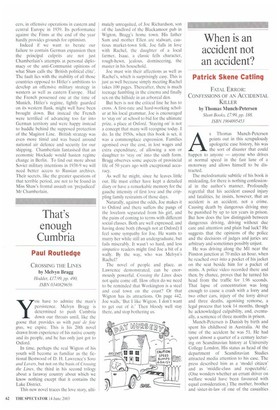That's enough Cumbria
Paul Routledge
CROSSING THE LINES by Melvyn Bragg Hodder, £17.99, pp. 490, ISBN 0340829656 you have to admire the man's persistence. Melvyn Bragg is determined to push Cumbria down our throats until, like the goose that provides us with pate de foie gras, we expire. This is his 20th novel drawn from experience of his native county and its people, and he has only just got to Oxford.
In time, perhaps the real Wigton of his youth will become as familiar as the fictional Bestwood of D. H. Lawrence's Sons and Lovers, but not on the basis of Crossing the Lines, the third in his second trilogy about a faraway country about which we know nothing except that it contains the Lake District.
This new novel traces the love story, ulti
mately unrequited, of Joe Richardson, son of the landlord of the Blackamoor pub in Wigton, Bragg's home town. His father Sam and mother Ellen are stalwart, cautious market-town folk. Joe falls in love with Rachel, the daughter of a local farmer, Isaac, a classic fells character, rough-hewn, jealous, domineering, the master in his household.
Joe must win their affections as well as Rachel's, which is surprisingly easy. This is just as well because simply meeting Rachel takes 100 pages. Thereafter, there is much teenage fumbling in the cinema and finally sex on the hillside in an arboreal den.
But hers is not the critical line he has to cross. A first-rate and hard-working scholar at his local grammar, Joe is encouraged to 'stay on' at school to bid for the ultimate prize, a place at Oxford. 'Staying on' is not a concept that many will recognise today. I do. In the 1950s, when this book is set. it was a commonplace expression. Families agonised over the cost, in lost wages and extra expenditure, of allowing a son or daughter to 'stay on' into the sixth form. Bragg observes some aspects of provincial life of 50 years ago with exceptional accuracy.
As well he might, since he leaves little Out. He must either have kept a detailed diary or have a remarkable memory for the gauche intensity of first love and the crippling family restraints of those days.
Naturally, against the odds, Joe makes it to Oxford and there suffers the pangs of the lovelorn separated from his girl, and the pains of coming to terms with different social classes. Both are well expressed, and having done both (though not at Oxford) I feel some sympathy for Joe. He wants to marry her while still an undergraduate, but fails miserably. It wasn't so hard, and less simpatico readers might find Joe a bit of a wally. By the way, who was Melvyn's Rachel?
The novel of people and place, as Lawrence demonstrated, can be enormously powerful. Crossing the Lines does not quite come off. How often do we need to be reminded that Workington is a steel and coal town on the coast? Or that Wigton has its attractions. On page 442, Joe wails, 'But I like Wigton. I don't want to get out of it.' Then bloody well stay there, and stop bothering us.


































































































 Previous page
Previous page